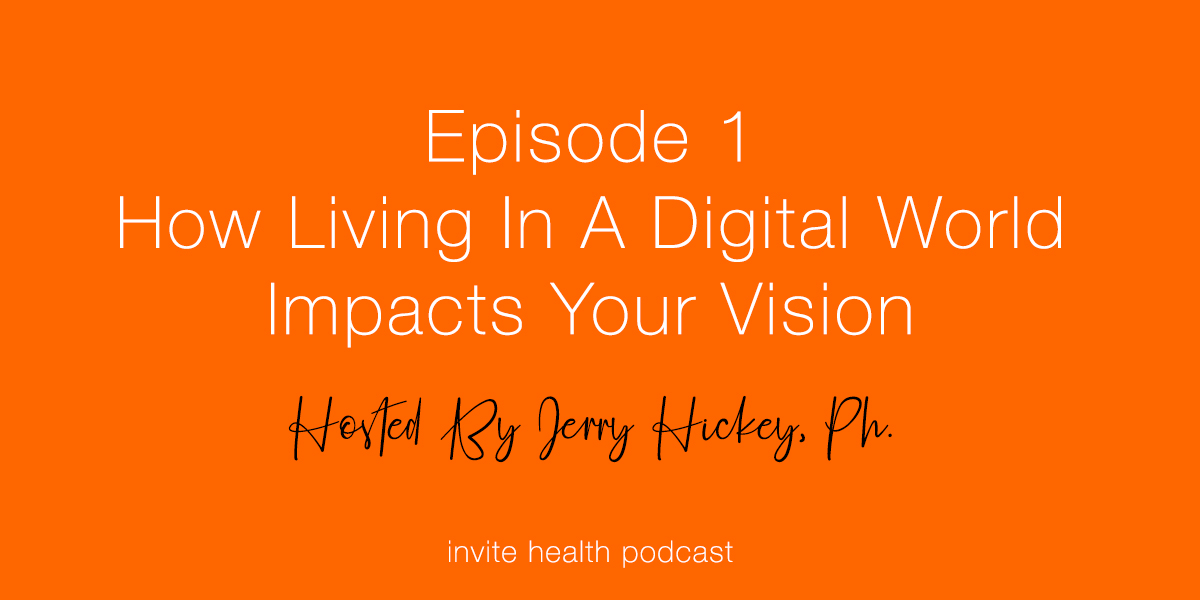How Living In A Digital World Impacts Your Vision – Invite Health Podcast, Episode 1

Subscribe Today!
Invite Health Podcast, Episode hosted by Jerry Hickey. Ph
Do you have computer vision syndrome? This happens when you spend a lot of time on your computer but also other screens, like your cell phone and your television. It leads to eye fatigue and eyestrain. Today, we are living in a digital world where escaping your screen can seem impossible. But here are some concerns you need to know about regarding your vision.
Stats on Screen Time
According to recent data, about 60% of people spend more than 6 hours a day in front of a screen; that’s a lot of time! Recent research shows that spending as little as two consecutive hours on a screen can lead to visual fatigue and, in more severe cases, eyestrain.
For teens, screen time is more extreme – a recent survey from the CDC found that many teens watch over four hours of TV daily. That’s in addition to computer use for four or more hours; and that’s not including spending time on a cellphone.
Impact of Blue Light On Your Eyes
Screen related fatigue is from over exposure to blue light. Blue light is all around us; and not just outside anymore. With technology, it’s followed us indoors and is emitted from your TV, computer, cellphone, video game screens and even from your cable box due to its LED lighting.
Visible light has particles that travel in waves and these waves have energy and a color is attached to them. Blue light has a very short wavelength compared to other colors – the shorter the wavelength the greater the energy. Because they are shorter and more energetic, these “Blue” wavelengths cause a flicker, which depletes your eyes of essential nutrients.
Recent research shows that spending as little as two consecutive hours on a screen can lead to visual fatigue and in more severe cases eyestrain.
Exposure is only getting worse. Advances made in digital screen technology has evolved dramatically over the past few years, and many of today’s electronic devices use LED background technology to help enhance screen brightness and clarity. These LEDs release very strong blue light waves.
Cell phones, computers, tablets and flat-screen televisions are among some of the other devices that use this technology. Because of their wide-spread use and increasing popularity, we are gradually being exposed to more and more blue light for longer periods of time. Our eyes’ natural filters do not provide enough protection against blue light rays from the sun, let alone the additional blue light exposure from these devices.
In young people and college students, excessive blue light exposure leads to brain fatigue and eyestrain. Digital eyestrain can affect learning and productivity. Symptoms of digital eyestrain, or computer vision syndrome, include blurry vision and sore eyes, difficulty focusing, twitching of the eye muscles, brain fatigue, and sometimes headaches, neck and back pain.
The Important Vision Nutrient Lutein
There is a proven, safe, affordable and fast acting simple solution for your eye fatigue. A pigment from vegetables called Lutein works mostly in a part of your eye called the retina. The retina is a very thin tissue covering the inner eyeball that contains many small fragile organs necessary for good vision.
In older adults, these organs can be damaged or even destroyed with excessive blue light exposure. Fortunately, in younger people, it just makes their eyes tired.
Lutein is found in a filter in front of the retina called the macula. The macula acts as a filter for blue light. The more Lutein that is concentrated in the macula, the more robust it is and the better it works as a blue light filter. In a study of young adults, a specific Lutein supplement called Lutemax 2020® reduced glare and reversed eye fatigue and even eye strain caused by computer screens. Students that use a high-quality Lutein supplement can get more work done on their computers and be more productive academically.
By the way, in young children, the excessive blue light exposure is actually dangerous. According to a study by the Kaiser family Foundation, children spend many hours a day using electronic screens. Before age 10, children’s eyes are not fully developed. The crystalline lens and cornea are still largely transparent and are easily overexposed to light, so too much exposure to blue light is a bad thing. Parents should be aware they need to supervise and limit the amount of screen time their children are permitted.
Thank you for listening to our episode on Living In A Digital World! In future related topics, I’ll discuss the relationship between screen time and eye disease in the elderly and an episode discussing the connection between declining vision and its connection with declining memory.
Thank you for tuning in to the Invite Health Podcast. You can find all of our episodes for free wherever you listen to podcasts or by visiting www.invitehealth.com/podcast. Make sure you subscribe and leave us a review! Follow us on Facebook, Twitter and Instagram at Invite Health today. We’ll see you next time on another episode of the Invite Health Podcast.
Key Topics:
- How blue light impacts your vision
- Aspects of a digital world, from your cell phone to your television
- A superior vision nutrient, Lutein
